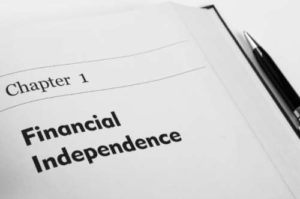Special to the Financial Independence Hub
If you are financially savvy and on your way to a secure retirement, you may already know the steps you should take to work toward financial independence. Maybe you’re already there.
But if you are climbing out of debt and just taking control of your money, financial independence (aka “Findependence”) might seem entirely out of reach. If you have kids, focusing on solving your own money problems may be complicated by your concern about their financial future too.
Financial independence means two different things at two different points in life. And they are both significant milestones. You and your adult children may even be working toward them at the same time!
Here are explanations of both kinds of financial independence and actions to consider to make the path to “FI” attainable, no matter where you are starting from.
Becoming Financially Independent from your parents
Adult children who no longer require any monetary support from their parents are financially independent. This doesn’t mean that a parent can’t provide some kind of financial aid if they choose, it means a child can meet their financial obligations without parental help.
With money concerns including five-figure student loans, rising rents, and considerable consumer debt, many young adults face an uphill battle when trying to leave their parents ‘financial’ nest. And parents may also be “sandwiched in” – helping their kids and providing support for aging parents while trying to save for retirement.
For the benefit of everyone involved, parents and adult children have a responsibility to each other to focus on changes and develop a plan to make financial independence a priority.
What can young adults do?
They can learn how to track expenses and make (and stick to) a budget. Making choices like sharing housing with friends and buying used cars or taking public transportation can also help 20-somethings tackle debt.
Over time, increased income from second jobs paired with making frugal choices like cooking at home, can provide the money adult children need to minimize and finally eliminate the need for parents to provide financial support.
What should parents do?
Parents should start setting limits on the assistance they provide their children. And they should work closely with them to create a plan to end all financial support over a set period of time. Parents need to realize they may actually be harming their kids by enabling their kids to make decisions that aren’t always focused on them becoming financially secure.
If a parent always steps in with a solution, their kids may not learn the importance of meeting their needs while putting off wants for the future. And this will only lengthen the time needed to reach financial independence.
Providing advice, emotional support, and helping adult children problem solve money troubles shifts the financial relationship to adults talking, rather than a parent instructing their child on what to do.
The other definition of financial independence is one that’s sometimes debated. But there is little argument that it should be a future goal of everyone. In general, reaching financial independence means you have enough income to pay for your living expenses for the rest of your life without having to work.
For some, this may come as early as their late 20’s or 30’s, while others may never reach financial independence before retirement age (or when they are forced to retire for other reasons.)
And even though many people who attain FI continue to work to earn some money, the idea is they don’t ever have to work again to pay their bills and afford the lifestyle they desire.
There are many ways to achieve financial independence, each with their own benefits and drawbacks. The strategies you choose to use and the timeline you decide to follow is what makes the path to financial independence personal.
Just don’t forget that it isn’t a race; you should also consider what will make you happy along the way to reaching your financial goals!
Finding Your Way
Consider these ten ideas that will help lead you down the path to financial independence.
1.) Think about your future without work and discuss it with your partner, family, or friends. What do you want in life? What are your hopes and dreams? What are your necessary expenses in the future? Then, set goals. Make a conservative estimate of how much the future you desire will cost each year. And don’t forget to include the cost of years of long-term care or some plan for assistance as you age. You definitely want a plan to support a very long life!
2.) Don’t assume you’ll be able to work until traditional retirement age or longer. Even if you love your job or think that you’ll always work at least part-time, you may not have that option.
3.) Determine how much debt you have and develop a plan to pay it off. It doesn’t all have to be paid off at once but paying off consumer debt, and any other high-interest debt needs to be a priority.
4.) Understand what your take-home pay is each month. What are ways that you can increase your income? Are there opportunities for advancement at work? Would taking on a part-time job (even a temporary one) in addition to your “day job” help you meet the goals you’ve set?
5.) Use a tool like Mint or Personal Capital to track your expenses and see if there is anything you can do to reduce them. If you’ve never tracked your spending before, you might be surprised to know where you can save money each month.
6.) Set up a monthly budget and understand that this will be a work in progress – especially early on. Then stick to your budget as tightly as you can.
7.) Put money into an emergency fund (ideally 3 to 6 months of living expenses) to avoid going into debt for unexpected problems. Consider keeping your emergency fund in a high-interest savings account too.
8.) Determine how much money you can put into investments (retirement accounts, real estate, or any type of investment meeting your needs and risk tolerance levels.)
9.) Monitor the growth of your net worth and continue to build streams of passive income that will help you generate enough income to pay for your living expenses for the rest of your life without having to work.
10.) And don’t make the mistake of forgetting about inflation in your calculations.
Obtain Financial Independence
 No matter which type of financial independence you are seeking, you will be less dependent on someone else in the long run!
No matter which type of financial independence you are seeking, you will be less dependent on someone else in the long run!
Adult children will really be “on their own” when they no longer need money from their parents. And when you have sufficient income to meet all of your needs and the lifestyle you want without having ever to work again, you’re no longer dependent on your employer.
Both are wonderful points where you can take more control of your money, your time, and your life!
 Vicki Peuckert Cook is the co-founder of Women Who Money and Women’s Money Talk, and the founder and blogger behind Make Smarter Decisions. This blog first appeared on the Women Who Money blog on August 21 and is republished on the Hub with her permission. Vicki enjoys writing about real estate investing, financial independence, career decisions, and travel. She holds a doctoral degree in Educational Leadership from the University of Rochester. She’s been a high school science teacher, a school administrator, and a college professor in her almost 30-year career as an educator. She’s also been a landlord for 25 years. Vicki left full-time employment after achieving financial independence and is now pursuing passion projects. She also has a passion for health and fitness and leads a Facebook Group with Jonathan Chevreau focused on the New York Time’s bestselling book, Younger Next Year.
Vicki Peuckert Cook is the co-founder of Women Who Money and Women’s Money Talk, and the founder and blogger behind Make Smarter Decisions. This blog first appeared on the Women Who Money blog on August 21 and is republished on the Hub with her permission. Vicki enjoys writing about real estate investing, financial independence, career decisions, and travel. She holds a doctoral degree in Educational Leadership from the University of Rochester. She’s been a high school science teacher, a school administrator, and a college professor in her almost 30-year career as an educator. She’s also been a landlord for 25 years. Vicki left full-time employment after achieving financial independence and is now pursuing passion projects. She also has a passion for health and fitness and leads a Facebook Group with Jonathan Chevreau focused on the New York Time’s bestselling book, Younger Next Year.



